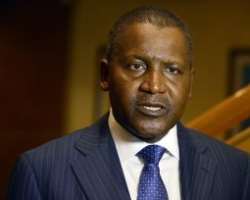What FG should do to get Nigeria out of recession: Dangote

Billionaire businessman , Aliko Dangote has offered a recipe for Nigeria economic recession which has resulted in grueling hardship across the land.
According to Dangote,the federal government should sell off national assets such as Nigerian Liquified Natural Gas company, NLNG as well as other dormant but huge capital-generating sectors and invest the proceeds back into the economy to bring Nigeria out of its current recession before the end of fourth quarter.
He spoke in an interview with CNBC Africa.
Dangote, who is the Africa’s richest man and the 25th in the world billionaire’s chart, said that the country’s needs such assets sale in order to quickly inject the proceeds into the economy for a possible reflation.
He said, “The only way for us to get out of this recession is to make sure we move into action quickly; action by diversifying the economy quickly. “If I had challenges in my company, I would not hesitate to sell assets, to remain afloat, to get to the better times, because it doesn't make any sense for me to keep any assets and then suffocate the whole organisation. “What we need to do now in my own thinking… we have a lot of assets to sell. We can sell part of the joint venture; part of the shares. You know government normally owns 60 percent. “We can sell in an open tender be it Chinese. We can change the term and make it an operating one, just like what we have in NLNG. We also have another asset I think we don't really need. “The African finance corporation; it can fetch them $800million easily. My own suggestion before was that they should even sell 100 percent of NLNG. I don't think government should be in any business of investing in sectors of LNG. “A company like that, with earnings of $1.5 billion on the average, they should get anywhere between $12 billion and $15 billion.”
Dangote suggested investing the proceeds back into the economy to boost development. “You will not believe that the crisis that we have today, if we have $15 billion, adding it to our $25 billion, that is $40 billion reserves. That will give confidence, confidence will come back, then government will back it up with proper economic policy, where people can see the roadmap. “Latest by fourth quarter we will be out of recession. It should be a partnership between government and private sector. We have all the answers, Nigeria falling into recession does not really scare me, if we take action. The businessman said if the government boosts reserves as suggested, the naira may fall to 250 to the dollar and help the economy.\
“Once we can sell assets, and put $15 billion together, you'd be very shocked at how much the dollar will actually drop, you can easily see 250. What is happening today is mere speculation. To currency, everybody will speculate, banks will speculate, companies will speculate, individuals will speculate, because if you have money you want to send in from abroad you will keep sending in trickles. If you know that CBN has $40 billion in reserves today, if you have $100,000, you might even sell it forward because you know that this rate is going to crash and you must quickly sell it.”
“If I had challenges in my company, I would not hesitate to sell assets, to remain afloat, to get to the better times, because it doesn't make any sense for me to keep any assets and then suffocate the whole organization,” Dangote said.
S & P branded the economy “weakened more than we expected owing to a marked contraction in oil production, a restrictive foreign exchange regime and delayed fiscal stimulus.”
The economy is set to contract on an annual basis in 2016 for the first time in 21 years, with its all-important oil industry suffering under weak global prices.
The gross domestic product (GDP) dropped by 2.06 percent in the second quarter of 2016, after falling 0.36 percent in the previous three months.
Dangote said the economy should have been diversified a long time ago, lamenting the overreliance on oil.
But he was optimistic that Nigeria would exit recession by the last quarter of the year and said the country “has all the answers” to bounce back to health.
